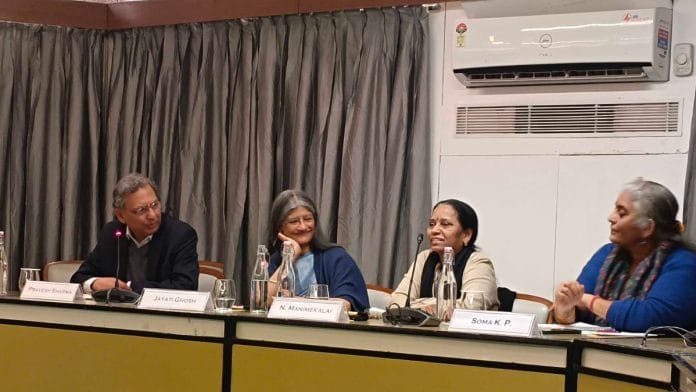Empowering women in agriculture is not just a matter of gender equity; it is a matter of food security and national development, said Soma KP of the Mahila Kisan Adhikaar Manch – MAKAAM – at a recent talk in Delhi.
‘Is Women-Centric Agricultural Policy the Next Big Idea in Agriculture?’, held at India International Centre, focused on women’s contribution to farming, and the hurdles they face in their quest for recognition. The panel comprised Jayati Ghosh, a professor at the University of Massachusetts; N Manimekalai, Director of the Centre for Women’s Development Studies, and Soma KP from MAKAAM, an informal forum that advocates for women farmers’ rights. They emphasised, with examples from their research and casework, how women make critical contributions to farming but face systemic barriers in terms of support and recognition.
“Women do 90 per cent of the agricultural work but are not recognised as farmers. They are often classified as unpaid helpers within family-run farms, despite their essential roles”, said N Manimekalai.
According to Jayati Ghosh, government schemes for women are mostly focused on marriage or education.
“Women-centric schemes are not related to the economic activities that women are actually doing. It is still difficult for them to get registered as farmers.”
The speakers concurred on the importance of such recognition. It would allow women farmers to access the resources available to their male counterparts – credit, insurance, and government schemes that are often out of reach for them due to their unrecognised status.
Battle for recognition
Land ownership remains one of the biggest barriers to women’s empowerment in the agricultural sector. Without secure land rights, they have limited control over resources. Women do most agricultural labour but seldom own the land. This restricts them from accessing policies/benefits meant for farmers.
“Women will not get the status of farmers until they have the land rights,” said Soma KP.
Another major challenge faced by women farmers, she added, is the involvement of corporate players and middlemen in the agricultural supply chain. This often means that the benefits do not reach them.
Next, KP highlighted that health and safety concerns hinder women’s participation in agriculture. While women are eager to enter the sector, they often step back due to safety concerns. Agricultural markets (mandis) are predominantly controlled by men, and lack basic facilities such as women’s washrooms apart from the obvious security issues.
According to Ghosh, a policy framework that acknowledges women’s contribution and addresses their specific needs is the need of the hour. “As men leave for work elsewhere, women are left behind to manage the land. This shift calls for targeted policies that address the unique challenges faced by women farmers.”
There are many organisations and NGOs – such as MAKAAM – that are striving to alleviate the distressing conditions of women farmers, stressed Meklai. They conduct advocacy and awareness campaigns, and organise capacity building programmes where they train them to use new technologies for farming. These organisations also help women farmers in their legal battles for land ownership. Such endeavours have “enabled women to take control of their agricultural practices and ensure food security for their families,” said Meklai. “Such initiatives are essential for creating an inclusive, equitable agricultural system.”
Also read:
Empowering women farmers
Some promising development schemes, centered around new technologies, are helping women claim their space in agriculture. These include Tamil Nadu’s Kisan Drone Scheme and Haryana’s Drone Didi Scheme, which train women as drone pilots. They use the technology to spray pesticides and fertilisers, significantly reducing the time and effort required by traditional farming methods.
“It’s a cost-effective, time-saving solution that empowers women to manage their farms more efficiently,” said KP.
KP also highlighted instances where women have asserted their rights despite roadblocks. In Rajasthan, she said, single women’s collectives are coming together to lease land as groups. “These single women work together in areas where male migration is very high, creating alternatives for how they can build a future for themselves.”
(Edited by Zoya Bhatti)






